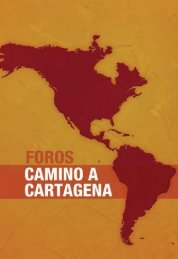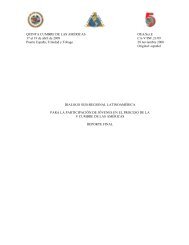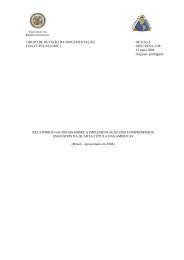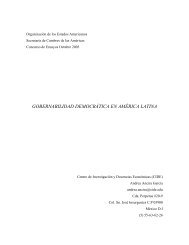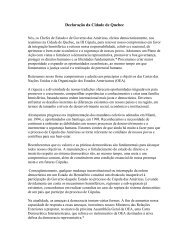The Road to Hemispheric Cooperation: Beyond the Cartagena
The Road to Hemispheric Cooperation: Beyond the Cartagena
The Road to Hemispheric Cooperation: Beyond the Cartagena
You also want an ePaper? Increase the reach of your titles
YUMPU automatically turns print PDFs into web optimized ePapers that Google loves.
Graph 5. Percentage of Students at <strong>the</strong> Lowest Performance Levels on PISA Math Test, 2009<br />
Shanghai-China<br />
Finland<br />
Korea<br />
Canada<br />
Es<strong>to</strong>nia<br />
New Zealand<br />
OECD average<br />
France<br />
Turkey<br />
Uruguay<br />
Mexico<br />
Chile<br />
Trinidad and Tobago<br />
Argentina<br />
Brazil<br />
Colombia<br />
Peru<br />
Tunisia<br />
Indonesia<br />
Panama<br />
Education Quality is Low<br />
0 10 20 30 40 50 60 70 80 90 100<br />
Source: A. J. Ganimian and A. Rocha Solano, Measuring Up? 2011 11<br />
Despite increases in spending and enrollments and growing<br />
awareness of <strong>the</strong> crisis in teaching and learning, <strong>the</strong><br />
reality is that most Latin American schools—from early<br />
childhood <strong>to</strong> tertiary—provide low-quality education that<br />
does not meet countries’ or students’ needs. For example,<br />
roughly half or more of Latin American students participating<br />
in <strong>the</strong> OECD’s most recent Programme for International<br />
Student Assessment (PISA) exam performed at<br />
<strong>the</strong> lowest levels, meaning that <strong>the</strong>y had difficulty applying<br />
basic reading and math skills <strong>to</strong> real world problems. By<br />
contrast, only about 20 percent of students in OECD countries<br />
performed at this level, while less than 10 percent in<br />
<strong>to</strong>p-performing countries did (Graph 5). Results from regional<br />
and national achievement tests are similarly low.<br />
Nor are quality issues confined <strong>to</strong> K-12 schools. While hard<br />
data on <strong>the</strong> quality of tertiary education is scarce, <strong>the</strong> evidence<br />
that does exist suggests that Latin American universities<br />
are not globally competitive. In a 2011-2012 ranking<br />
of <strong>the</strong> world’s 400 <strong>to</strong>p universities by <strong>the</strong> London Times, no<br />
Latin American University ranked in <strong>the</strong> <strong>to</strong>p 100, and only<br />
three (two in Brazil and one in Chile) were included at all. 12<br />
In a similar ranking conducted by <strong>the</strong> Shanghai Jiao Tong<br />
University, no Latin American university ranked in <strong>the</strong> <strong>to</strong>p<br />
100, and only three (Universidad de São Paulo in Brazil,<br />
Universidad de Buenos Aires in Argentina, and Universidad<br />
Nacional Autónoma in Mexico) ranked in <strong>the</strong> <strong>to</strong>p 200. 13 In<br />
<strong>to</strong>tal, 25 Latin American universities made <strong>the</strong> <strong>to</strong>p 500 (15<br />
from Brazil, 4 from Mexico, 4 from Argentina, and 2 from<br />
Chile). By comparison, South Korea had 22 universities in<br />
<strong>the</strong> <strong>to</strong>p 500 and China had 72.<br />
Moreover, in most countries, less than one-quarter of all university<br />
graduates receive science or engineering degrees<br />
and few receive doc<strong>to</strong>rates. 14 Brazil, with one of <strong>the</strong> most<br />
extensive university systems in <strong>the</strong> region, produces only<br />
one Ph.D. for every 70,000 people. Chile produces one<br />
for every 140,000. <strong>The</strong> OECD averages about one per every<br />
5,000 people. 15 University accreditation systems are<br />
weak, few faculty members have doc<strong>to</strong>rates, accountability<br />
is nearly non-existent, and funding for public universities<br />
<strong>The</strong> <strong>Road</strong> <strong>to</strong> <strong>Hemispheric</strong> <strong>Cooperation</strong>: <strong>Beyond</strong> <strong>the</strong> <strong>Cartagena</strong> Summit of <strong>the</strong> Americas<br />
<strong>The</strong> Brookings Institution ❘ Latin America Initiative<br />
35<br />
Students at <strong>the</strong>se levels have difficulty<br />
solving problems that require <strong>the</strong>m <strong>to</strong><br />
make direct inferences from presented<br />
information. <strong>The</strong>y also have problem<br />
representing key data graphically or using<br />
basic algorithms, formulae, procedures or<br />
conventions.



